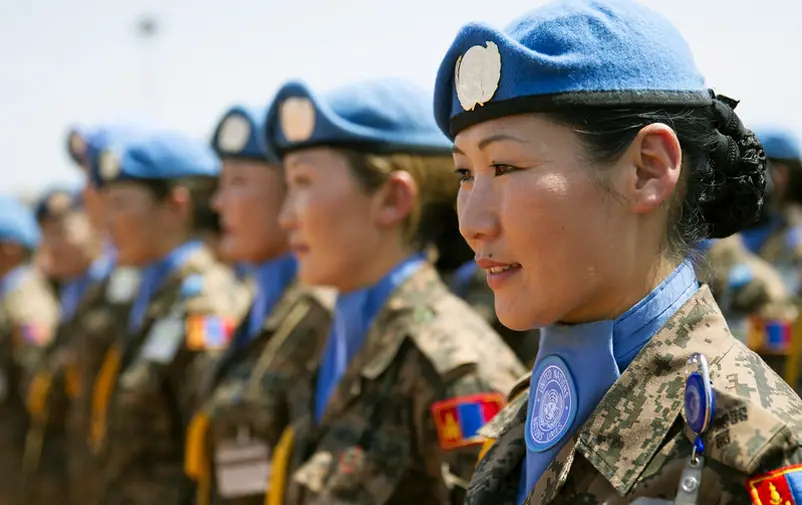
Photo: UN Photo/Martine Perret
Since the onset of Russia’s full-scale invasion in February 2022, Ukraine has launched various initiatives focused on reconstruction, recovery, and resilience.
– While the international community has significantly supported these reconstruction efforts and committed to continuing its support, the emphasis has predominantly been on physical infrastructure and financial aspects of recovery and reconstruction planning, says Eldridge Adolfo, Senior Dialogue and Peace Mediation Adviser at FBA.
To bridge this gap, FBA has partnered with three Ukrainian networks specializing in the rule of law, development, and conflict resolution, mobilizing hundreds of organizations across local, regional, and national levels, to foster a more inclusive approach to Ukraine's recovery and rebuilding.
Maryana Malachivska-Danchak, Founder and CEO of Fama Agency within the Rule of Law Network, emphasizes the significant shifts in Ukraine's social group structures and demographics due to the war, including the increase in internally displaced persons, single mothers, people who have lost their homes and suffered from sexual violence, the emergence of new military and civilian groups, as well as a rise in physical and mental injuries.
– An inclusive approach will allow for the consideration of the vast needs of diverse social groups and ensure their participation in the process of resource allocation and decision-making regarding reconstruction. This will contribute to social cohesion and, consequently, long-term stability, says Maryana.
Victor Liakh, CEO at East Europe Foundation, (EEF), echoes the necessity that the principles and approaches to the reconstruction of Ukraine acknowledges the needs and opinions of the entire society.
– It is important not only to win the war but also not to lose a just peace. If every Ukrainian feels that their voice is heard and taken into account, it will also help unite society and mobilize resources for post-war reconstruction, says Victor.
Natalia Bezkhlibna, Head of Secretariat of the Ukrainian Community of Dialogue Practitioners, (UCoDP), highlights the range of war experiences among Ukrainians, from front-line service to displacement, both domestically and abroad, to the loss of loved ones and homes, and living under occupation, leading to diverse expectations and visions of a just peace.
– In these circumstances, dialogue can serve both as an approach and tool to recognize and embrace diverse experiences, fostering the restoration of the social fabric necessary for developing unified solutions. It can reconcile differing expectations and viewpoints, paving the way for building common plans for Ukraine's future, says Natalia.
With a network that includes hundreds of non-governmental organizations and local communities, the EEF plans to involve civil society representatives with relevant expertise or experience in rebuilding their communities in dialogue on post-war recovery and reconstruction.
– Effective discussion also requires the participation of state authorities, for which we aim to also facilitate reliable relationships and trustful dialogue between the state, the public sector, and the business environment, says Victor.
Eldridge, who leads the FBA's partnership initiative for inclusive recovery and reconstruction in Ukraine, emphasizes the importance of integrating critical areas such as social cohesion, human security, human rights, gender equality, and the perspectives of youth and generations from the start of planning international reconstruction aid, while ensuring Ukrainian stakeholders lead the processes.
– Together with our partner networks, we are organizing extensive consultations this spring. This will culminate in representatives of the networks participating in this year's International Ukraine Recovery Conference in Berlin, where they will present their findings and recommendations, says Eldridge.
He adds that the conference plays a key role in shaping the continued international support for Ukraine, making it essential that a wide range of Ukrainian actors are present and involved in setting the agenda.
The necessity of Ukraine’s reconstruction being inclusive and locally-led is echoed by the partner networks:
– We, the citizens of Ukraine, are both the driving force and beneficiaries of reconstruction. We greatly need external help and support and are very grateful to all international partners – but no one else can take on the task of shaping and realizing the future of Ukraine and our local communities, states Natalia.
Read more about FBA’s support to Ukraine.
MORE FROM HOME
What does research tell us about strategic civil-military leadership in UN integrated missions? The recent FBA research brief "Mission Leaders: An Evidence-based Assessment” presents seven policy recommendations.
2025-07-01 13:34FBA has both increased and adapted its work in Ukraine in the wake of Russia's invasion.
FBA in UkraineKlara Grenhagen works as a specialist at FBA's Africa unit with a focus on dialogue, reconciliation and peace processes.
More about our expertsFBA is part of Sweden’s development aid within the area of peace and security
Read more about the countries where we work